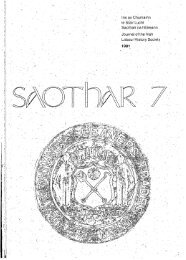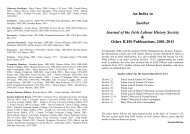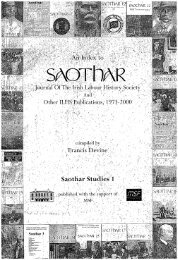108 SAOTHAR 13made. A copy of this material was then sent to the IALHI Archives in Zurich, and a copy was used aspart of an exhibition in the Orchard Gallery, Derry, depicting the international history of May Daycelebrations.Michael HarkinTyovaen Arkisto, The Finnish Social Democratic ArchivePaasivuorenkatu5B, 00530 Helsinki. Open during winter time, Monday, Wednesday and Friday, 11to 5; Tuesday and Thursday, 11 to 8: during summer time, Monday, Wednesday and Friday, 10 to 4;Tuesday and Thursday, 10 to 7Tyovaen Arkisto, founded in 1909, forms the oldest and largest private archive dealing with socialand political matters in Finland. It is the central archive for the Social Democratic labour movementand many other labour organisations and contains three thousand shelf metres of material.There are six permanent employees plus a secretary for the Oral History Commission (Tyovaenmuistitietotoimikunta). The archive is run by a foundation and its board contains representatives of thetrade unions, the Social Democratic Party (Suomen Sosialidemokraattinen Puolue), the Workers'Educational League (Tyovaen Sivistysliitto) and of academic circles. The state provides sixty five percent funding with the balance coming from the SDP, the People's Educational Fund (KansanSivistysrahasto), the Association of Labour Tradition (Tyovaenperinne ry) and certain trade unions.The archive uses Dewey's decimal system (a former variation of today's UDK-classification) inarranging material. The provenance is applied inside its collections. The five major collections are:(1) Social Democratic Party with all material over 15 years freely open; (2) trade union movement(Soumen Ammattijarjesto), the Organisation of the Finnish Trade Unions, 1907-30, about eightynational unions and some two thousand local trade unions; (3) about 2,400 local labour associations;(4) biographical including, among others, K.A. Fagerholm, Tellervo M. Koivisto, Pentti Kymensalo,Tyyne Leivo-Larsson, Vaino Leskinen, Matti Paasivuori, Martta Salmela-Jarvinen, Miina Sillanpaa,Yrjo Sirola, Emil Skog, Vaino Tanner, N.R. afUrsin, Edvard V alpas, Niilo Wallari and Axel Ahlstrom;and (5) the Finnish Civil War of 1918.Other major collections include: Finnish Socialist Labour Party (S uomen Sosialistinen Tyovaenpuole,SSTP) 1920-23; Finnish Swedish Labour League (Finlands Svenska Arbetar-forbund); SocialDemocratic League of Workers and Small Farmers (Tyovaen ja Pienviljelijain SosialidemokraattinenLiitto); and the Leagues of Social Democratic Women, Youth, Temperance, Education, TenantFarmers and Athletes. In addition to documents there are 50,000 photographs, thousands of posters,badges and banners.In 1987 the archive's library associated with the collections of the Folk Archive (Kansan Arkisto)and formed an indepenant Library of the Labour Movement (Tyovaenliikkeen Kirjasto) run by theAssociation of Labour Tradition controlled by all the major organisations of the Finnish labourmovement. The library is adjacent to the archive and can easily be visited. The library has threeemployees and some 140,000 volumes. The printed records and histories of many organisations arealso in the library. There is much international material here as well as Finnish .. The Oral History Commission of the labour movement operates from the archive, its activitiesdirected by experts from history, folklore and labour. Begun in 1960, there are now 150,000 pages oftranscripts of over 6,000 persons. They cover the period from the turn of the century to the present.Seven books based on this collection have been published.The 1918 Civil War cut the nation in two. It made the viewpoint of labour unpopular for academicresearch. It was not until the 1970s that labour history enjoyed a renaissance in Finnish universities.
SOURCES 109In 1966 the Finnish government, when SDP Chairman Rafael Paasio was Prime Minister, began aproject on Red Finland, 1917-18 and after twenty years the project has come to fruition with manydissertations. In the 1980s, many labour organisations began sociological and history surveys ofthemselves including the Finnish TUC. Hannu Soikkanen, 'the grand old man' of Finnish labourhistory, is writing a major work on the SDP. Finally there has, of course, been a rich functioning ofthe'bare-foot' non-academic research.Simo LaaksovirtaTheses AbstractsSeamus S. Duffy, Mechanics' and Similar Institutesin Counties Antrim, Armagh and Down, 1820-1870,and their Contribution to the Education of theworking class Adult. (DPhil, University of Ulster,Magee, 1987)This is a study of the Mechanical Institutes andsimilar societies in the counties of Antrim, Armagh andDown in the period 1820-1870. It was the aim of thisresearch to throw some light on an heretofore neglectedaspect of the social history of education. The investigationwas based on the minute books of varioussocieties in the local newspapers of the day. This lattersource was, indeed, where much of the information wasunearthed. Other sources which provided some informationwere contemporary pamphlets, and governmentreports.The work is divided into an introductory sectionwhere the self-help philosophy is examined, and theMechanics' Institute movement in England is treated asan expression of that philosophy. A chapter on the Irishsocio-econorruc background precedes a study of howthe self-help philosophy impinged on the Irish consciousness.The main part of the work, a study ofindividual societies in the counties of Antrim, Downand Armagh then follows.In the case of Armagh, it is the Mechanics' Institutein the City of Armagh that is treated in depth, thoughreference is made to the later Natural History andPhilosophical Society. The history of working classeducation in Belfast then follows. Here, again, it is theBelfast Mechanics' Institute which forms the mainbody of the study. However, other important attemptsat educating the Belfast working classes' are alsomentioned. Principal among these latter are the WorkingClasses Association with its associated People'sReading Rooms, and the government sponsored Schoolof Art. In dealing with County Down, efforts at selfhelpin education in Downpatrick are dealt with in somedetail, and the chapter concludes with an examinationof other interesting societies in County Down.The concluding chapter of the thesis attempts todraw together the threads which have been pursued inthe case studies. It is the author's conclusion that theMechanics' Institutes and similar societies in NortheastUlster contributed to a significant extent to theeducation of the working class adult in a period wherethe provision of such education was veryJow on the listof priorities of successive governments.Eithne McLaughlin, Maiden City Blues: Employmentand Unemployment in Derry City, (PhD.,Queen's University, Belfast, 1987)This study used qualitative and quantitative, historicaland contemporary, data and methods to examinegender, household, and familial relationships and rolesin the context of an area which has experienced veryhigh male unemployment rates since the mid-nineteenthcentury. Lack of economic development in thearea and the corresponding dominance of the clothingindustry (employing a 90% female labour force) has ledto both popular and official representation of the city asa place where traditionally 'women work and men areon the dole'.The study found, however, that household economicpractice and labour supply, both in the past andpresent, has borne little relation to this social andpolitical representation of the city. The causes andimplications of the disparity between representationand practice is explored and the complex interplay ofsocio-economic practice, economic policy and Stateintervention, and political and social constructions of'gender' and 'unemployment' drawn out. The contradictionsand strains of everyday life inherent in an areacharacterised by high male unemployment, a highintensity of women's reproductive role and femalecentredkin networks, and dependence of the localmanufacturing base on (primarily young, single) femalelabour, set in a wider framework of Church andState definitions of men as heads ofhouseholds/providersand political division and conflict with the State,form the conclusions of this study.
- Page 1 and 2:
JOURNAL OF THE IRISH LABOUR HISTORY
- Page 3 and 4:
ContentsPageEditorial: Labour Histo
- Page 5 and 6:
EDITORIAL 3freedom to participate i
- Page 7 and 8:
CorrespondenceThe Irish Labour Part
- Page 9 and 10:
; ~ ; ,The Decline and Fall of Donn
- Page 11 and 12:
THE DECLINE AND FALL OF DONNYBROOK
- Page 13 and 14:
THE DECLINE AND FALL OF DONNYBROOK
- Page 15 and 16:
·' THE DECLINE AND FALL OF DONNYBR
- Page 17 and 18:
THE DECLINE AND FALL OF DONNYBROOK
- Page 19 and 20:
THE DECLINE AND FALL OF DONNYBROOK
- Page 21 and 22:
THE DECLINE AND FALL OF DONNYBROOK
- Page 23 and 24:
THE DECLINE AND FALL OF DONNYBROOK
- Page 25 and 26:
,'-,;-''''.A PASSAGE TO BRITAIN 23C
- Page 27 and 28:
A PASSAGE TO BRITAIN 25only in the
- Page 29 and 30:
A PASSAGE TO BRITAIN 27clothing._De
- Page 31 and 32:
A PASSAGE TO BRITAIN 29established
- Page 33 and 34:
;:-.",.- .. .", ...... '.:. '
- Page 35 and 36:
LOUIE BENNETI 33feminist movement w
- Page 37 and 38:
:... ~: ."
- Page 39 and 40:
-.- '.LOUlE BENNETT 37While there i
- Page 41 and 42:
LOUIE ~ENNEIT 39Xl's encyclical Qua
- Page 43 and 44:
LOUIE BENNEIT 41Bennett's own relat
- Page 45 and 46:
LODIE BENNETT 43109; IWWU resolutio
- Page 47 and 48:
Essays in ReviewCosherers, Wanderer
- Page 49 and 50:
••• .".'. >. '~"ESSA YS IN RE
- Page 51 and 52:
ESSAYS IN REVIEW 49ConnolIy:Myth an
- Page 53 and 54:
ESSAYS IN ~EVIEW 51tion' in the Int
- Page 55 and 56:
ESSAYS IN REVIEW53International:'I
- Page 57 and 58:
REVIEWScontroversy is real history.
- Page 59 and 60: REVIEWSJoe Monks was among the earl
- Page 61 and 62: REVIEWSnolly-Column Song','Proudly
- Page 63 and 64: REVIEWSresulting from the arrival o
- Page 65 and 66: REVIEWS,63the book by means of an a
- Page 67 and 68: REVIEWSlogue, it is hardly surprisi
- Page 69 and 70: The Team For All Workers ...CULIAIB
- Page 71 and 72: ESSAYS 69mission and moral refonn.l
- Page 73 and 74: .. ...... ~.~ -~ .'- '.ESSAYS. 71fr
- Page 75 and 76: ESSAYS 73claimed authority but whic
- Page 77 and 78: ESSAYS 75provided the basis for soc
- Page 79 and 80: ESSAYS 779. For comparisons see E.T
- Page 81 and 82: ESSAYS 7952. Annals of Christ Churc
- Page 83 and 84: ESSAYS' 81Fianna Fail and the Worki
- Page 85 and 86: ESSAYS 83Eireann in 1925 visibly di
- Page 87 and 88: ESSAYS 85recognition of the impract
- Page 89 and 90: ESSAYS 871970, it created the condi
- Page 91 and 92: ESSAYS89The Irish Immigrants' Contr
- Page 93 and 94: ESSAYS" 91Although anti -Catholic p
- Page 95 and 96: ESSAYS 93McCowie played a key role
- Page 97 and 98: :. -,,'.' ',. .~.,:.ESSAYS 95Althou
- Page 99 and 100: ESSAYS 97young girl of their own ba
- Page 101 and 102: SourcesIrish Labour History Society
- Page 103 and 104: SOURCES 101INovember, 1971 to no. 1
- Page 105 and 106: SOURCES 103would claim credit for t
- Page 107 and 108: SOURCES105Sources for Irish Labour
- Page 109: SOURCES 107NorthWest Archives and L
- Page 113 and 114: TURNINGANEWLEAFThe CPSSUis the larg
- Page 115 and 116: REMINISCENCE 113us due to my politi
- Page 117 and 118: REMINISCENCE 115when Jim was presen
- Page 119 and 120: REMINISCENCE 117of Dail Eireann. 17
- Page 121 and 122: REMINISCENCE 119NotesThe above arti
- Page 123 and 124: DOCUMENT STUDY 121James Connolly in
- Page 125 and 126: DOCUMENT STUDY123SOCIAL DEMOCRATIC
- Page 127 and 128: DOCUMENT STUDY 125proletariat of th
- Page 129 and 130: DOCUMENT STUDY 127the support of Je
- Page 131 and 132: DOCUMENT STUDY 12926. The Workers'
- Page 133 and 134: 131BibliographyA Bibliography of Ir
- Page 135 and 136: BIBLIOGRAPHY 133Compton, P.A. Demog
- Page 137 and 138: BIBLIOGRAPHY 135Levine, I. and Madd
- Page 139 and 140: BIBLIOGRAPHY 137Turner, M. 'Towards
- Page 141 and 142: BIBLIOGRAPHY 1394. Land and Agricul
- Page 143 and 144: BIBLIOGRAPHY 141Clogher Record12 (2
- Page 145 and 146: BIBLIOGRAPHY 143Political Research
- Page 147 and 148: BIBLIOGRAPHY 145Pres, 1987.O'Brien,
- Page 149 and 150: 147Notes on Contributorsf onathanBe
- Page 151 and 152: 1901: Ireland's first general union
- Page 153 and 154: ELECTRICAL TRADES UNION .Establishe





